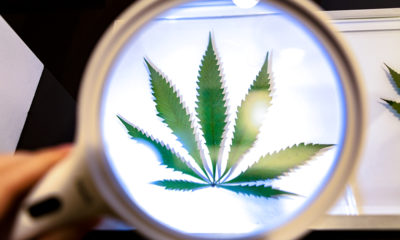
Medical
Medical Marijuana Is Literally Too Popular for Oklahoma to Handle
Flood of applications from prospective cannabis patients closes state Medical Marijuana Authority customer service center.
Medical marijuana is proving immensely popular in Oklahoma, where the drug has been legally available for less than six months — so popular that the Oklahoma Medical Marijuana Authority (OMMA) is at the moment literally overwhelmed by patient demand.
Oklahoma voters legalized medical marijuana last June, passing Question 788 by a decisive 15-point margin at the polls, with more than 58 percent of voters in favor.
In what is both a land-speed record and a model for other states to follow, the state’s medical marijuana program launched less than two months later on Aug. 25 — without any strict caps on the number of licenses it would issue to storefront dispensaries or cultivators.
As for how many of Oklahoma’s 3.9 million residents would seek state approval to use cannabis?
Officials guessed between 40,000 and 80,000 for the first year, with more later.
They may have been off.
By Dec. 9, the OMMA had issued 754 dispensary licenses and 1,206 licenses to cultivate plus another 25,000 patient licenses.
Dispensaries would sell just shy of $1 million worth of cannabis that first month.
By the end of February, the number of licensed patients in the state had more than tripled, to 65,000.
As of February 25, 65,752 patient, 456 caregiver and 3,718 business applications received. 69,926 total.
54,253 patient, 331 caregiver, 1,041 dispensary, 1,836 grower and 508 processor licenses approved. 57,969 total.— Oklahoma Medical Marijuana Authority (@OMMAOK) February 25, 2019
Under state law, Oklahoma cannabis authorities are required to process a patient’s application to use cannabis legally within two weeks.
In the fall, OMMA was processing about 1,200 patient applications per week.
But by February, the office started receiving about 5,000 applications a week — with another 1,000 calls to a customer-service call center every day, according to KJRH-2, a Tulsa, Oklahoma-based NBC affiliate.
The flood of applications has led OMMA to temporarily shut down the customer-call center. Its employees have been reassigned to processing the backlog of patient applications, as KFOR first reported.
According to owners of Oklahoma dispensaries — who would certainly like as many patients licensed as possible, for obvious reasons — the state’s inability to handle the demand for legal cannabis has frustrated many would-be medical-marijuana patients, many of whom are over 60.
Currently, the only way to receive a medical marijuana “card” in the state is via an online application. (Compare this to other states, where medical-marijuana recommendations from physicians were granted in person or via telemedicine, creating a cottage industry that might not always have been immune to corruption but was at least reliably quick and efficient.)
With OMMA unable to process paperwork quickly and the call-center temporarily shut down, Oklahomans unsure how to access cannabis have been calling dispensaries, who in turn can do nothing but direct them to OMMA, KFORS reported.
That’s annoying, but that’s a good problem to have.
It means that the examples of other states — including Arkansas and North Dakota, both of which legalized medical marijuana in 2016 but have yet to records a sale — where setting up a medical-marijuana program has taken years, where officials have banned smokable marijuana (something that Oklahoma could have done but chose not to), and where officials have so limited cultivation and retail licenses that it created an incentive to continue patronizing the black market are examples of government slow-rolling and bureaucratic inefficiency.
In Oklahoma, a deep-red state, a medical-marijuana program went from a fantasy to a ballot measure to a real thing in less than a year.
In the Oklahoma state Legislature, lawmakers overwhelmingly voted to approve a bill to more strictly regulate the state industry and offer more rules for patients — including an outright defiance of federal law that would allow patients to carry guns.
In other words: Oklahoma is an object lesson that there is nothing especially difficult or complicated about legalizing medical marijuana, which is near-guaranteed to be overwhelmingly popular.
TELL US, do you use marijuana for medical reasons?
























